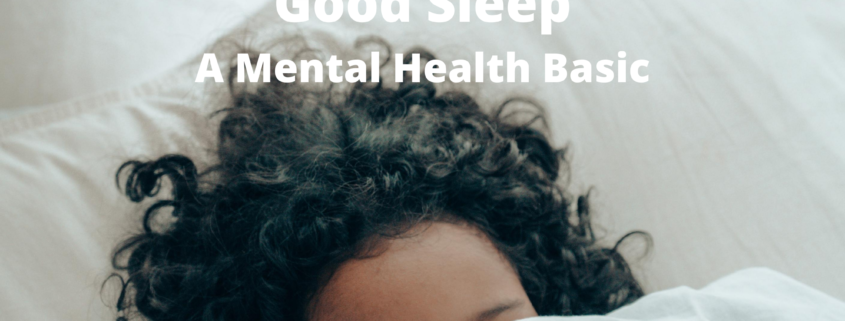Good Sleep, A Mental Health Basic
One of the basic needs for good mental health is adequate sleep. Adequate sleep helps regulate moods, improve memory and concentration, improve creativity, and decrease stress. Adequate sleep in children also promotes growth and improves attention and learning. Too little sleep can cause forgetfulness, fatigue, irritability, poor physical performance, increased stress and anxiety, and depression. Severe or prolong sleep deprivation can cause hallucinations, paranoia, and mood swings. Because of individual differences sleep needs can vary. Infants generally require 16 hours a day, elementary age children require between 9 to 11 hours of sleep per night, teenagers need an average of 8 to 9 hours per night, and most adults need an average of 7 to 9 hours per night.
Although sleep is a normal biological process, The National Institute of Health reported that approximately 30 percent of the population experience insomnia, a sleep condition which causes difficulty going to sleep and staying asleep. Insomnia can occur for short periods or be ongoing. It is associated with many psychological conditions, such as anxiety, depression, ADHD, and bipolar disorder.
Good sleep habits (sometimes referred to as sleep hygiene) can help with a good night’s sleep. Daytime behaviors, especially just before bedtime, can have a major impact on the ability to go and stay asleep. Daily routines – what you eat and drink, the medications you take, how you schedule your days, and how you choose to spend your evenings – can significantly impact your quality of sleep.
Sleep hygiene is especially important during stressful times and as we attempt to re-establish bedtimes for returning to school. So here are some simple and quick tips to help establish and maintain healthy sleep habits.
- Establish a nighttime routine: Keep a consistent sleep schedule. Go sleep at the same time every night. Set a bedtime that is early enough to get the needed amount of sleep. Get up at the same time every day, even on weekends or during vacations.
- Create a comfortable bedroom environment: A dark and quiet environment that is not too warm or not too cold is comfortable for most people. Make sure to have comfortable bedding and mattresses.
- Relax before going to sleep: With all the current uncertainty in the world, it can be hard to quiet the mind to sleep. Engage in soothing activities prior to bedtime to create a relaxing mood:
- Bedtime yoga. A yoga routine before bed can help you unwind and relieve stress, helping your body relax and go to sleep.
- Essential oils. Some essential oils, such as lavender and chamomile are helpful with relaxation. They can be consumed in tea, used in oils and lotions for massaging and moisturizing the skin after a shower or bath, or used in an essential oil diffuser.
- Warm milk. A cup of warm milk before bedtime can help relax the mind prior to sleep. Milk contains tryptophan, a sleep-inducing amino acid.
- Go to bed when sleepy: If you don’t fall asleep after 20 minutes of being in bed don’t stress about not falling asleep, get out of bed and sit in a chair listen to soothing music, read, or do some deep breathing exercises until you are sleepy. Then return to bed.
- Limit exposure to bright light: Put away your phone and/or other electronic devices and turn off your television. Log off the internet or social media at least 30 minutes before bedtime.
- Avoid activities that will stimulate or energize: Don’t eat a large meal or consume alcohol or caffeine before bedtime. If you are hungry at night, eat a light, healthy snack. Don’t exercise before bedtime.







Leave a Reply
Want to join the discussion?Feel free to contribute!